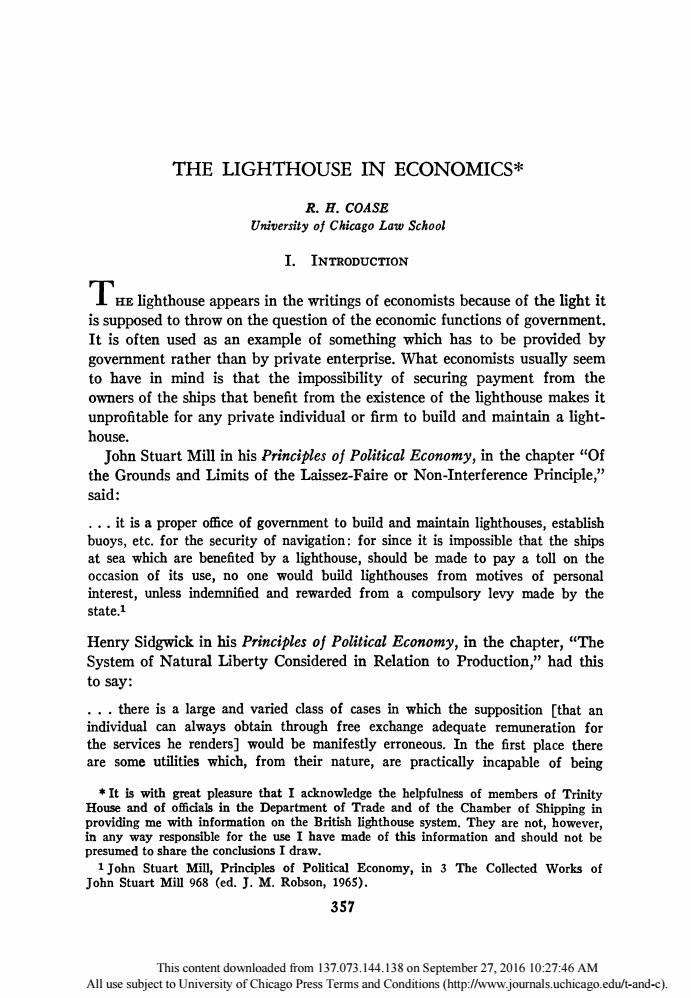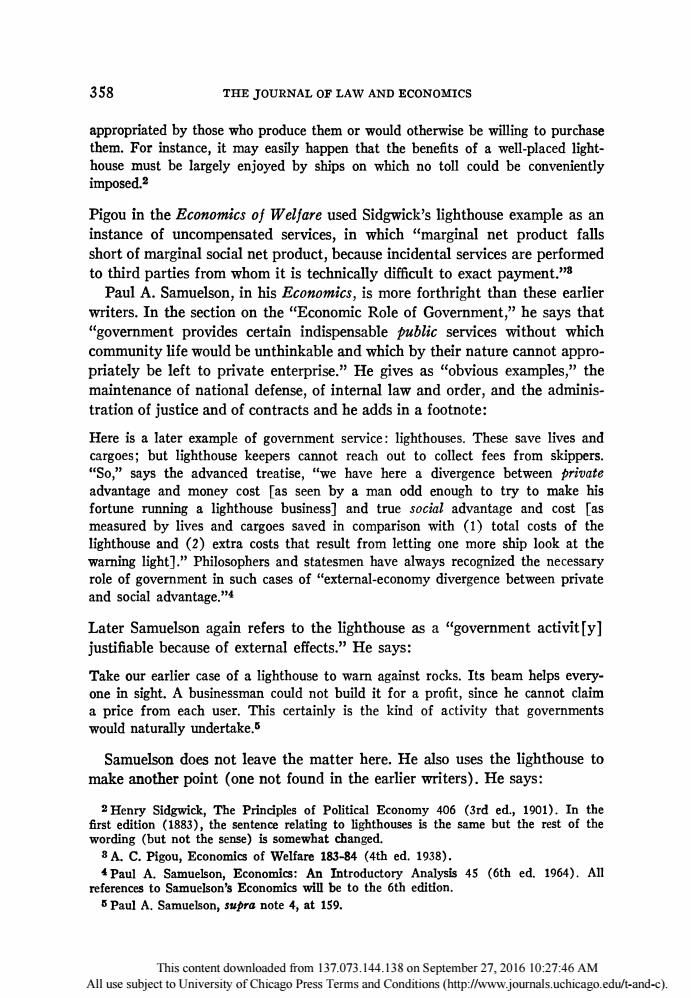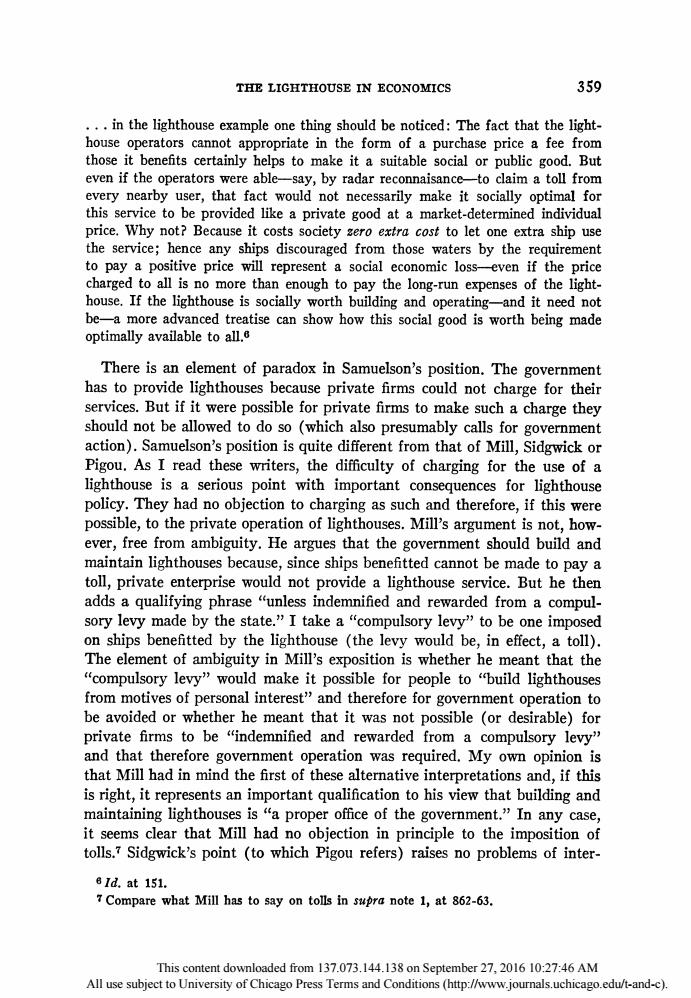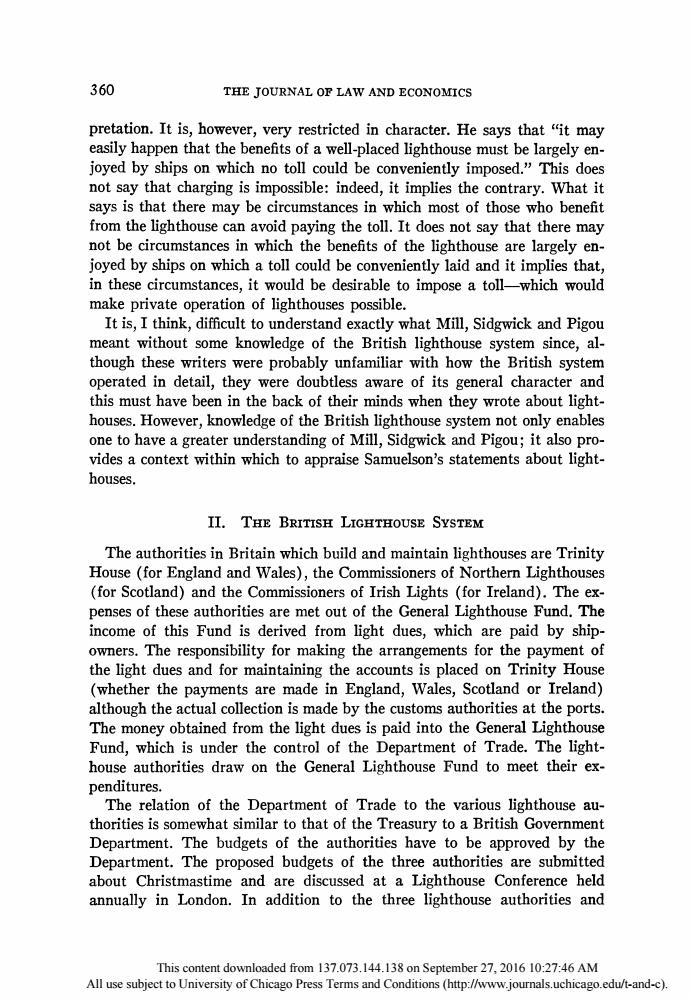
THE LIGHTHOUSE IN ECONOMICS* rhCOASE University of Chicago Law School I.INTRODUCTION lighthouse appears in the writings of economists because of the light it is suppo ed to throw on the question of the economic f It is often used as an example of something which has to be provided by government rather than by private enterprise.What economists usually seem to have in mind is that the impossibility of securing payment from the owners of the ships that benefit from the existence of the lighthouse makes it unprofitable for any private individual or firm to build and maintain a light- house John Stuart Mill in his Principles of Political Economy,in the chapter"Of the Grounds and Limits of the Laissez-Faire or Non-Interference Principle," said: it is a proper office of government to build and maintain lighthouse s establish buo the ce it is imp sible that the ships by a lighth d be C) sion of its e to tol pa a I on the ould bu nified ouse fron mo ves o Henry Sidgwick in his Principles of Political Economy,in the chapter The System of Natural Liberty Considered in Relation to Production,"had this to say: there is a large and varied class of cases in which the supposition [that an individual can alw ays obtain through free exchange adequate tion for the services he renders]would be manifestly erron eous.In the first place the aresom,from their nature,are practically incapable of being +It is with great pleasure that I acknowledge the helpfulness of members of Trinity in the ade and of the Chamber of Shipping in in any way presumed to share the conclusions I draw. 357 Terms and Conditions(http://www.journals.uchicago.edu/t-and-c)
This content downloaded from 137.073.144.138 on September 27, 2016 10:27:46 AM All use subject to University of Chicago Press Terms and Conditions (http://www.journals.uchicago.edu/t-and-c)

358 THE JOURNAL OF LAW AND ECONOMICS appropriated by those who produce them or would otherwise be willing to purchase them.For instance,it may easily happen that the benefits of a well-placed light- house must be largely enjoyed by ships on which no toll could be conveniently imposed.2 Pigou in the Economics of Welfare used Sidgwick's lighthouse example as an instance of uncompensated services,in which "marginal net product falls short of marginal social net pro to third partiesfromwhom it is technicallyiffculttoxact payment Paul A.Samuelson,in his Economics,is more forthright than these earlier writers.In the section on the"Economic Role of Government,"he says that "government provides certain indispensable ublic services without which community life would be unthinkable and which by their nature cannot appro- priately be left to private enterprise."He gives as "obvious examples,"the maintenance of national defense,of internal law a nd order,and the adminis tration of justice and of contracts and he adds in a footnote: Here is a later example of government service:lighthouses.These save lives and ers cannot reach out to collect fees from skipp we have here a dive rgence bety een advantae 「ass gh to try to make his fort lighth and true and ost ra ured by cargo ve total t result fr ng one mo hip look at the ng light].”」 costs tha sophers and the nece and social advantage. Later Samuelson again refers to the lighthouse as agovernment activit[y] justifiable because of external effects."He says: Take our earlier case of a lighthouse to warn against rocks.Its beam helps every- one in sight.A businessman could not build it for a profit,since he cannot claim a price from each user.This certainly is the kind of activity that governments would naturally undertake.s Samuelson does not leave the matter here.He also uses the lighthouse to make another point (one not found in the earlier writers).He says: ) The Principles of Politic in u he sense)is somewhat changed. hthoeme buttht the 8A.C.Pigou,Economics of Welfare 183-84 (4th ed.1938). 4 Paul A. omics:An Introductory Analysis 45 (6th ed.1964).All references to Samuelson's Economics will be to the 6th edition. 5 Paul A.Samuelson,supra note 4,at 159. This wnloaded from 137073 144 138 on Se ember27201610-27-46AM All use subject to University of Chicago Press Terms and Conditions (http://www.journals.uchicago.edu/tand-c)
This content downloaded from 137.073.144.138 on September 27, 2016 10:27:46 AM All use subject to University of Chicago Press Terms and Conditions (http://www.journals.uchicago.edu/t-and-c)

THE LIGHTHOUSE IN ECONOMICS 359 inthe lighthouse thing should be noticed:The fact that the light e operator cannot appropriate in the form of a purchase price a fee from those it benefits certainly helps to make it a suitable social or public good.But even if the operators were able-say,by radar reconnaisance-to claim a toll from every nearby user,that fact would not necessarily make it socially optimal for this service to be provided like a private good at a market-determined individual price.Why not?Because it costs society zero extra cost to let one extra ship use the service;hence any ships discouraged from those waters by the requirement to pay a positive price will represent a social economic loss even if the price charged to all is no more than enough to pay the long-run orth building expenses of the light- house.If the lighthouse is sociallv and c and it need not be -a more advanced treatise can show ho thi cial go od is optimally available to all.e orth being ma There is an element of paradox in Samuelson's position.The government has to provide lighthouses ecause private firms could not charge for their services.But if it were possible for private firms to make such a charge they should not be allowed to do so (which also presumably calls for government action).Samuelson's position is quite different from that of Mill,Sidgwickor Pigou.As I read these writers,the difficulty of charging for the use of a lighthouse is a serious point with important consequences for lighthouse policy.They had no objection to charging as such and therefore,if this were possible,to the private operation of lighthouses.Mill's argum ent is not,how ever,free from ambiguity.He argues that the government should build and maintain lighthouses because,since ships benefitted cannot be made to pay a toll,private enterprise would not provide a lighthouse service.But he then adds a qua rase nle ndemnified and rewarded from a compul sory levy made by the state."I take a"compulsory levy"to be one imposed on ships benefitted by the lighthouse (the levy would be,in effect,a toll). The element of ambiguity in Mill's exposition is whether he meant that the ory levy wo uld make it possible for people tould lighthouses from motives of personal interest"and therefore for government operation to be avoided or whether he meant that it was not possible (or desirable)for private firms to be "indemnified and rewarded lev and th t therefore government operation was required.My own opinion is that Mill had in mind the first of these alternative interpretations and,if this is right,it represents an important qualification to his view that building and maintaining lightho proper office of the any case it seems clear that Mill had no objection in principle to the imposition of tolls.7 Sidgwick's point (to which Pigou refers)raises no problems of inter- 81d.at151 7Compare what Mill has to say on tolls in supra note 1,at862-63. Alluse subject toniversi of chi on Seperber 0110AM edu/t-and-c)
This content downloaded from 137.073.144.138 on September 27, 2016 10:27:46 AM All use subject to University of Chicago Press Terms and Conditions (http://www.journals.uchicago.edu/t-and-c)

360 THE JOURNAL OF LAW AND ECONOMICS pretation.It is,however,very restricted in character.He says that "it may easily happen that the benefits of a well-placed lighthouse must be largely en joyed by shins on which no toll c ould be imposed,.”This doe not say that charging is impossible:indeed,it implies the contrary.What it says is that there may be circumstances in which most of those who benefit from the lighthouse can avoid paying the toll.It does not say that there may not be circumstances in which the benefits of the lighthouse are largely en joyed by ships on which a toll could be conveniently laid and it implies that, in these circumstances,it would be desirable to impose a toll-which would make private operation of lighthou possible It is,I think,difficult to understand exactly what Mill,Sidgwick and Pigou meant without some knowledge of the British lighthouse system since,al- though these writers were probably unfamiliar with how the British system p erated in detail,they were doubtless aware of its general character and this must have been in the back of their minds when they wrote about light- houses.However,knowledge of the British lighthouse system not only enables one to have a gre eater understanding of Mill,Sidgwick and Pigou;it also pro vides a context within which to appraise Samuelson's statements about light. houses. IL THE BRITISH LIGHTHOUSE SVSTEM The authorities in Britain which build and maintain lighthouses are Trinity House (for England and Wales),the Commissioners of Northern Lighthouses (for scotland)and the commissioners of irish lights (for ireland).The ex- penses of thes e authorities are met out of the General Lightho ouse Fund.The income of this Fund is derived from light dues,which are paid by ship- owners.The responsibility for making the arrangements for the payment of the light dues and for maintaining the accounts is placed on Trinity House (whether the payments are made in England,Wales,Scotland or Ireland) although the actual collection is made by the customs authorities at the ports. The money obtained from the light dues is paid into the General Lighthouse Fund,which is under the ntrol of the D partmen of Trade.The light- house authorities draw on the General Lighthouse Fund to meet their ex- penditures. The relation of the Department of Trade to the various lighthouse au- thorities is somewhat similar to that o of the Tre sury to a British Gov Department.The budgets of the authorities have to be approved by the Department.The proposed budgets of the three authorities are submitted about Christmastime and are discussed at a Lighthouse Conference held annually in London.In addition to the three lighthouse authorities and This wnloaded from 137073 144 138 on Se ember27201610-27-46A All use subject to University of Chicago Press Terms and Conditions(http://www.journals.uchicago.edu/t-and-c)
This content downloaded from 137.073.144.138 on September 27, 2016 10:27:46 AM All use subject to University of Chicago Press Terms and Conditions (http://www.journals.uchicago.edu/t-and-c)

THE LIGHTHOUSE IN ECONOMICS 361 the Department,there are also present at the conference members of the Lights Advis, Committee,a c ommittee of the Chamber of Shipping (a trade association)representing shipowners,underwriters and shippers.The Lights Advisory Committee,although without statutory authority,plays an important part in the review pre cedure and the as it expresses taken into account both by the lighthouse authorities in drawing up their budgets and by the Department in deciding on whether to approve the budgets.The light dues are set by the Department at a level which will yield,over a period of rs,an amount of money sufficient to meet the likely expenditures.But in deciding on the program of works and changes in existing arrangements the participants in the conference,and particularly the mem- bers of the Lights Advisory Committee,have regard to the effect which new works or changes in existing arrangements would have on the level of light dues The basis on which light dues are levied was set out in the second Schedule to the Mercha nt ing (Mercantile Marine Fund)Act of 189.Modifica- tions to the level of the dues and in certain other respects have been made since then by Order in Council but the present method of charging is essen. tially that established in 1898.The dues are so much per net ton e for all vesels arrivin at or departing from.ports case of "Home Trade"ships,there is no further liability for light dues after 'sduo-u opue 01 is no further liability afte 6o) ages. The light dues different for these two categories of ship and are such that,for a s ship of given size,10 voyages for a"Home Trade"ship yield approximately the same sum as 6 voyages for a "Foreign-going"ship.Some categories of ship pay at a lower rate per net ton:sailir gvessels of more thar 00 tons and cruise ships.Tugs and pleasure yachts make an annual payment rather than a payment per voyage.In addi- tion,some ships are exempt from light dues:ships belonging to the British or Foreign Governments (unless ca ying carg r passe for remunera tion),fish ing vessels,hoppers an dredges,sailing vessels (except pleasure yachts)of less than 100 tons,all ships (including pleasure yachts)of less than 20 tons,vessels (other than tugs or pleasure yachts)in ballast,or put- ting in for bunker fuel or stores be ase of the haz rds of the sea.Al these statements are subject to qualification.But they make clear the general nature of the scheme. The present position is that the expenses of the British lighthouse service are met out of the General Lighthouse Fund,the income of which comes from light dues.In addition to expenditures on lighthouses in Great Britain 861&62Vic.c44.sch.2 e地9gnme28063om570731458 on sepier虹.2016102726N cago Conditions(http://www.journals.uchicago.edu/t-and-c)
This content downloaded from 137.073.144.138 on September 27, 2016 10:27:46 AM All use subject to University of Chicago Press Terms and Conditions (http://www.journals.uchicago.edu/t-and-c)